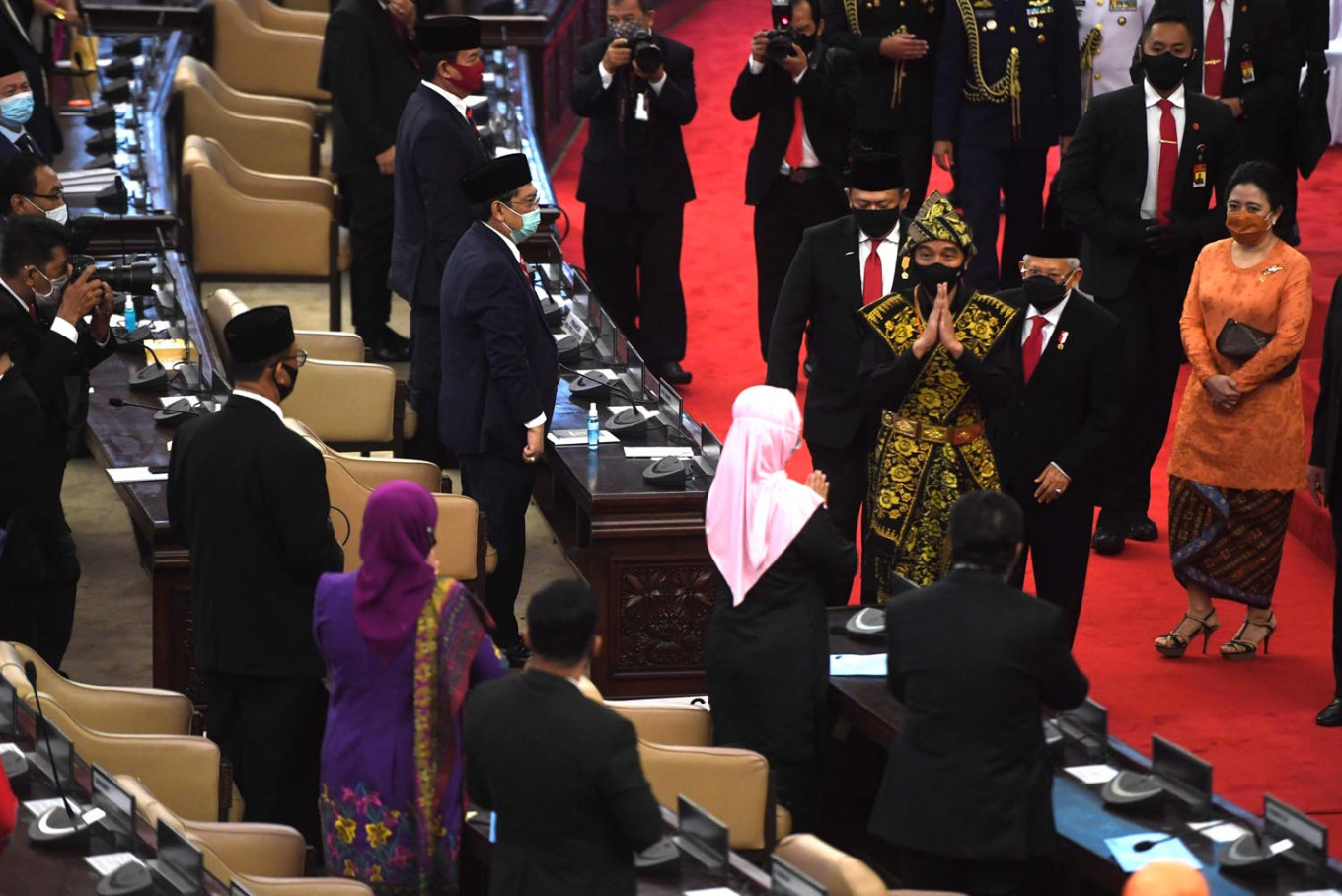Popular Reads
Top Results
Can't find what you're looking for?
View all search resultsPopular Reads
Top Results
Can't find what you're looking for?
View all search resultsMPR, Palace advisers mull indirect elections
Critics lambast plan as ‘irrelevant’ solution.
Change text size
Gift Premium Articles
to Anyone
T
he People’s Consultative Assembly (MPR) and members of the Presidential Advisory Board (Wantimpres) have broached the idea of bringing back indirect regional elections, inciting fears that the country’s democracy would face yet another setback.
After a closed-door meeting at the Senayan legislative complex in Central Jakarta earlier this week, which brought together figures of the ruling coalition, Assembly Speaker Bambang Soesatyo of Golkar revealed plans to revisit the indirect election system as part of a review of the country’s democracy after the Reform era.
Bambang suggested that the current election system was prone to corruption, as evidenced in recent years by the many regional leaders who were convicted of graft, a major issue he insists would not be resolved by simply optimizing the Corruption Eradication Commission (KPK).
He said the MPR and Wantimpres are in the midst of identifying the problems and would invite scholars and technocrats to study the pros and cons of direct regional elections, including the cost of political campaigning.
The result of the study would then be submitted to the House of Representatives for deliberation, the Golkar politician said.
“We will ask members of the House to review [the merits of direct regional elections]. Does the current system we are using have more advantages or disadvantages?” Bambang told reporters on Monday.
It was not the first time that the Assembly speaker has broached a topic that critics fear would be injurious to democracy. Previously, Bambang proposed a limited amendment to the 1945 Constitution, which drew suspicions that it was meant to facilitate the extension of current presidential term limits.
Setting back democracy
Good governance activists have lambasted the proposal to revive indirect elections, with some calling it “a step back” for democracy.
Al Araf, the executive director of human rights watchdog Imparsial, said the idea would take away people’s political right to elect their leaders and hold them accountable.
“It means that we are going backwards to a time when regional leaders were only elected by the political elite, who do not necessarily represent the aspirations of the people,” he told The Jakarta Post.
For years, the nation was used to carrying out indirect elections, in which governors, mayors and regents were picked by members of local legislative councils. After the 2004 Regional Administrations Law was enacted, they were elected directly using a “one man, one vote” scheme.
Lawmakers had already sought to revive indirect elections through the enactment of the 2014 Regional Election Law. At the time, the draft bill cited that a change in the system was needed in order to save money and prevent conflict.
However, then-president Susilo Bambang Yudhoyono shot down the motion by issuing two government regulations in lieu of law (Perppu), effectively bringing back direct voting in response to nationwide protests.
According to Noory Okthariza, a political researcher from the Jakarta-based Center for Strategic and International Studies (CSIS), direct elections offer people a chance to learn how to choose the right leader for their respective regions, in spite of the fact the system was not perfect.
The process of learning to participate in a democracy would not bear any fruit if it is implemented within a short span of time, Noory suggested. In this light, he insists that direct voting practices should not be prematurely stopped.
‘Irrelevant’ solution
Observers have also questioned Bambang’s reasoning for the plan, which he said aims to prevent local leaders from getting involved in graft. Some called out the proposed solution as irrelevant to eliminating the root cause of the problem, which is entrenched money politics.
Al Araf said that corruption involving regional leaders is usually attributed to the high political costs that candidates must bear throughout campaigning. Instead of changing the voting mechanism, the onus should be on political parties to build consensus on banning money politics.
“The problem is not direct elections, but an electoral process that is clouded by money politics. The Assembly and the Wantimpres leadership should instead be talking about how to prevent money politics and improve the integrity of political parties,” he said.
Noory touched on similar themes, saying that revoking people’s rights to elect their own leaders will not automatically guarantee a decrease in corrupt practices among elected officials, with money politics still rampant.
The idea to switch to indirect elections was “irrelevant” because even that system leaves gaps for corruption, he said, especially when election candidates can just as easily buy off votes from regional legislators and keep the money circulating among the political elite.
Indirect elections also only tend to benefit the ruling party or incumbent leaders, who have ready access to public sources of funding and state authority, the analyst said. This, in turn, keeps the race from becoming a level playing field for independent or lesser-known candidates.










